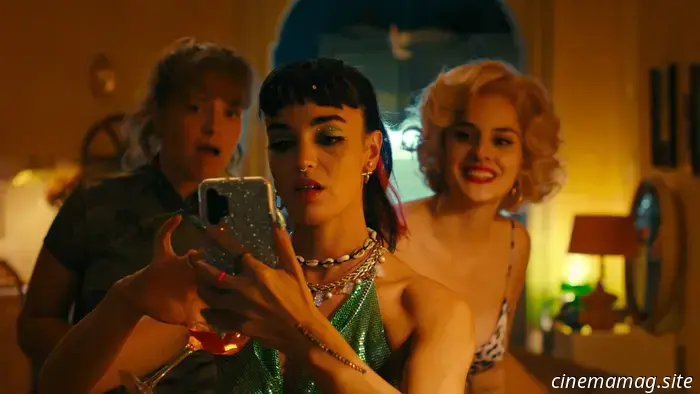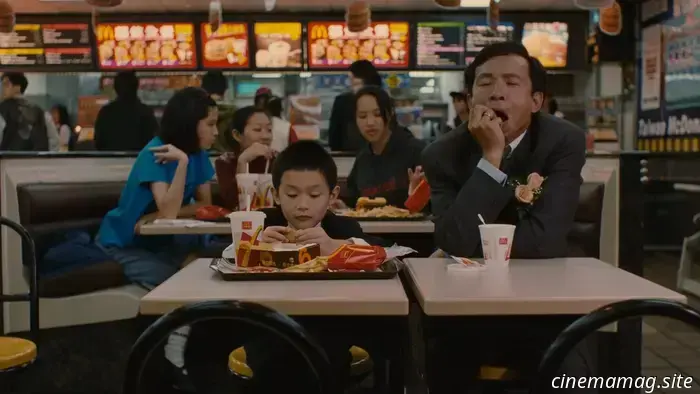
The Balconettes Review: Noémie Merlant's Confident Interpretation of Comedy-Horror
Note: This review was initially published as part of our coverage of Cannes 2025. The Balconettes will be released in theaters on August 22.
The stylish balconies of Marseille present a picturesque scene that serves as a fitting introduction to Noémie Merlant’s second feature, The Balconettes, especially showcased through the sweeping view of a crane shot. As the camera glides over the facades and their baby-blue shutters, one might be reminded of Rear Window. Yet, the small figures of men and women struggle to endure the heat, while we, as viewers, enjoy a privileged glimpse into their homes. On one such balcony, a woman endures yet another beating but decides this time to fight back. This marks the beginning of a film that intertwines elements of comedy and supernatural horror to explore the various ways women care for one another in the face of violence.
The Balconettes is Merlant’s second directorial feature, following her shorts and the 2021 Cannes submission Mi Iubita Mon Amour. This modest film revolves around a woman who engages in an affair with a 17-year-old boy during her bachelorette trip in Romania. While Mi Iubita had some narrative challenges, despite its beautiful visuals and sense of uncertainty, it felt somewhat disappointing. The Balconettes showcases the type of film that Merlant is meant to create: vibrant, humorous, and daring, serving as a true testament to the strength of female friendship depicted through farcical and horror elements.
During a heatwave, with windows thrown open, the residents of Marseille can easily observe their neighbors’ lives. Nicole (Sanda Codreanu), a writer and dreamer, is the first to notice an attractive man across the street. He (Lucas Bravo, known from Emily in Paris) remains unnamed throughout the film, but his physique certainly grabs attention. Inspired, Nicole begins crafting an erotic tale about this enigmatic man––seemingly the closest she will come to a romantic adventure this summer, until her flatmate Ruby (Souhelia Yacoub), an uninhibited camgirl, strikes up a conversation with him. Soon, with the erratic presence of their actress friend Èlise (Merlant), the three of them find themselves heading to his apartment for a party. However, as is common in a sweltering nude photographer’s studio, things take a turn for the worse.
A comedy of mistakes runs alongside a painfully authentic narrative about rape: these two conflicting aspects of existence are what the three women must confront throughout the film. Merlant exhibits great empathy as a director, and with assistance from Céline Sciamma––who is credited as a collaborator on the script––she effectively addresses feminism while navigating between absurdity and grotesqueness. Cinematographer Evgenia Alexandrova captures the women both individually and collectively with equal care in long shots and close-ups; the gradual development of their shared strength is mirrored in both interior and exterior scenes, with the trio’s central positioning commanding attention.
Visually, The Balconettes bursts with colors and textures reminiscent of Almodóvar, and while the absurdity of some comedic moments may come as a shock––you won’t believe what happens to the neighbor’s penis, for instance––Merlant maintains a strong focus on the political message against abuse and violence. The film incorporates some rape-revenge tropes, but it notably avoids the pitfall of vilification for its own sake. Merlant understands that women don’t need to belittle men to reclaim their bodies or assert their equality, making her an exceptional director for such a genre blend. That said, I personally would refrain from looking through my neighbor’s window for now.
The Balconettes premiered at the 2024 Cannes Film Festival.

Other articles
 A new trailer for Kiss of the Spider Woman featuring Diego Luna, Tonatiuh, and Jennifer Lopez has been released.
Lionsgate has released an additional trailer for director Bill Condon's adaptation of Manuel Puig's celebrated 1976 novel and Terrence McNally's Tony Award-winning Broadway musical, Kiss of the Spider Woman. Featuring Diego Luna, Tonatiuh, and Jennifer Lopez, the film depicts the unexpected friendship that develops between two prisoners as one shares the story of a […]
A new trailer for Kiss of the Spider Woman featuring Diego Luna, Tonatiuh, and Jennifer Lopez has been released.
Lionsgate has released an additional trailer for director Bill Condon's adaptation of Manuel Puig's celebrated 1976 novel and Terrence McNally's Tony Award-winning Broadway musical, Kiss of the Spider Woman. Featuring Diego Luna, Tonatiuh, and Jennifer Lopez, the film depicts the unexpected friendship that develops between two prisoners as one shares the story of a […]
 The cherished 1992 Amiga classic Apidya will be arriving on PC and consoles in 2026.
The Amiga was recognized for its excellent shoot-'em-ups, and the iconic 1992 title Apidya was notable for its vibrant visuals, precise gameplay, and unique design. Recently, the original creators of the game, in collaboration with a devoted fan who became a developer and ININ Games, announced Apidya’ Special, an authentic 24-bit pixel remake derived from a previously shelved console port from the 1990s […]
The cherished 1992 Amiga classic Apidya will be arriving on PC and consoles in 2026.
The Amiga was recognized for its excellent shoot-'em-ups, and the iconic 1992 title Apidya was notable for its vibrant visuals, precise gameplay, and unique design. Recently, the original creators of the game, in collaboration with a devoted fan who became a developer and ININ Games, announced Apidya’ Special, an authentic 24-bit pixel remake derived from a previously shelved console port from the 1990s […]
 Information about Marvel Rivals Season 3: The Abyss Awaken has been disclosed.
Marvel Games and NetEase Games have unveiled additional information regarding Season 3: The Abyss Awaken of the popular Super Hero Team-Based PVP Shooter, Marvel Rivals. This upcoming season will introduce a wealth of new content for fans, featuring a new map to battle on, an entirely new game mode, and more. Below are fresh videos highlighting the new […]
Information about Marvel Rivals Season 3: The Abyss Awaken has been disclosed.
Marvel Games and NetEase Games have unveiled additional information regarding Season 3: The Abyss Awaken of the popular Super Hero Team-Based PVP Shooter, Marvel Rivals. This upcoming season will introduce a wealth of new content for fans, featuring a new map to battle on, an entirely new game mode, and more. Below are fresh videos highlighting the new […]
 The first-look trailer for the psychological horror-thriller Blockhead has been released in anticipation of its world premiere at FrightFest.
Before its world premiere this weekend at FrightFest, Blue Finch Films has released a trailer for the psychological horror-thriller Blockhead, which represents Matt Harlock's first narrative feature as a director; he is known for the acclaimed documentary American: The Bill Hicks Story. The film features performances from Danny Horn (Doctor Who), Joe Sims (Broadchurch), and Michele Moran (The Witcher). The […]
The first-look trailer for the psychological horror-thriller Blockhead has been released in anticipation of its world premiere at FrightFest.
Before its world premiere this weekend at FrightFest, Blue Finch Films has released a trailer for the psychological horror-thriller Blockhead, which represents Matt Harlock's first narrative feature as a director; he is known for the acclaimed documentary American: The Bill Hicks Story. The film features performances from Danny Horn (Doctor Who), Joe Sims (Broadchurch), and Michele Moran (The Witcher). The […]
 A new VR game titled Star Trek: Infection has been unveiled at Gamescom 2025.
VR developers Played With Fire and Broken Mirror Games have announced Star Trek: Infection, an immersive full-body VR experience set in the cherished Star Trek universe, which will be released on Meta Quest 3 and Steam VR later this year. Check out the new trailer below… In Star Trek: Infection, you will enter a psychological and physical nightmare as a Vulcan Starfleet officer […].
A new VR game titled Star Trek: Infection has been unveiled at Gamescom 2025.
VR developers Played With Fire and Broken Mirror Games have announced Star Trek: Infection, an immersive full-body VR experience set in the cherished Star Trek universe, which will be released on Meta Quest 3 and Steam VR later this year. Check out the new trailer below… In Star Trek: Infection, you will enter a psychological and physical nightmare as a Vulcan Starfleet officer […].
 Yi Yi Trailer: Edward Yang's Masterpiece of the 21st Century Gets a 4K Restoration
Regardless of the fact that a child born the day after Edward Yang's passing will begin college this month, the Taiwanese director's reputation has increased significantly in the past 18 years. As a result, a Criterion release or restoration premiere generates more enthusiasm than nearly any contemporary film. I believe this is the rightful acknowledgment for work that
Yi Yi Trailer: Edward Yang's Masterpiece of the 21st Century Gets a 4K Restoration
Regardless of the fact that a child born the day after Edward Yang's passing will begin college this month, the Taiwanese director's reputation has increased significantly in the past 18 years. As a result, a Criterion release or restoration premiere generates more enthusiasm than nearly any contemporary film. I believe this is the rightful acknowledgment for work that
The Balconettes Review: Noémie Merlant's Confident Interpretation of Comedy-Horror
Note: This review was first released as part of our coverage of Cannes 2025. The Balconettes will be released in theaters on August 22. The stylish balconies of Marseille provide a visually appealing scene to introduce Noémie Merlant’s second feature, The Balconettes, particularly when viewed from the sweeping angle of a crane shot. As the
